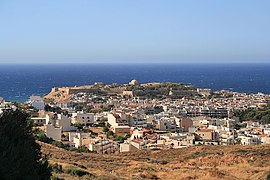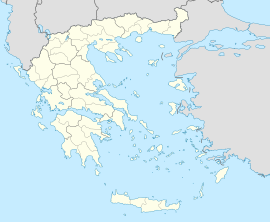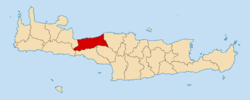This article needs additional citations for verification. (November 2024) |
Rethymno (also Rethymnon; Greek: Ρέθυμνο [ˈreθimno]) is a city in Greece on the island of Crete. It is the capital of Rethymno regional unit, and has a population of more than 35,000 inhabitants (nearly 40,000 for the municipal unit). It is believed to have been built on the site of the earlier city of Rhithymna.
Rethymno
Ρέθυμνο | |
|---|---|
 View of Rethymno with the Venetian Fortezza fortress | |
| Coordinates: 35°22′08″N 24°28′26″E / 35.36889°N 24.47389°E | |
| Country | Greece |
| Administrative region | Crete |
| Regional unit | Rethymno |
| Municipality | Rethymno |
| Area | |
| • Municipal unit | 126.5 km2 (48.8 sq mi) |
| • Community | 26.777 km2 (10.339 sq mi) |
| Elevation | 17 m (56 ft) |
| Population (2021)[1] | |
| • Municipal unit | 38,759 |
| • Municipal unit density | 310/km2 (790/sq mi) |
| • Community | 35,763 |
| • Community density | 1,300/km2 (3,500/sq mi) |
| Time zone | UTC+2 (EET) |
| • Summer (DST) | UTC+3 (EEST) |
| Postal code | 741 00 |
| Area code(s) | 28310 |
| Vehicle registration | ΡΕ |
| Website | www.rethymno.gr |
History
editRethymno is believed to have been built on the site of the earlier city of Rhithymna.[2][3] Some sources mention a city called Arsinoe which some scholars have proposed stood at the same site.[4][5][6]
Rethymno began a period of growth when the Venetian conquerors of the island decided to establish an intermediate commercial station between Heraklion and Chania, acquiring its own bishop and nobility in the process. Today's old town (palia poli) was almost entirely built by the Republic of Venice. It is one of the best-preserved old towns in Crete.
From circa 1250 the city was the seat of the Latin Diocese of Retimo, which was renamed Retimo–Ario after the absorption in 1551 of the Diocese of Ario and as suppressed only after the Turkish conquest.
The town still maintains its old aristocratic appearance, with its buildings dating from the 16th century, arched doorways, stone staircases, Byzantine remains, the small Venetian harbour and narrow streets. The Venetian Loggia houses the information office of the Ministry of Culture and Sports. A Wine Festival is held there annually at the beginning of July. Another festival, in memory of the destruction of the Arkadi Monastery, is held on 7–8 November.
The city's Venetian-era citadel, the Fortezza of Rethymno, is one of the best-preserved castles in Crete. Other monuments include the Neradje Mosque (the Municipal Odeon arts centre), the Great Gate (Μεγάλη Πόρτα or "Porta Guora"), the Piazza Rimondi and the Loggia.
The town was captured by the Ottoman Empire in 1646 during the Cretan War (1645–69) and they ruled it for almost three centuries. The town, called Resmo in Turkish, was the centre of a sanjak (administrative part of a province) during Ottoman rule.
During the Battle of Crete (20–30 May 1941), the Battle of Rethymno was fought between German paratroopers and the Second Australian Imperial Force and Hellenic Army. Although initially unsuccessful, the Germans won the battle after receiving reinforcements from Maleme in the Northwestern part of the island.
Today the city's main income is from tourism, many new facilities having been built in the past 20 years. Agriculture is also notable, especially for olive oil and other Mediterranean products.
Municipality
editThe municipality of Rethymno was formed at the 2011 local government reform by the merger of the following 4 former municipalities, that became municipal units:[7]
- Arkadi
- Lappa
- Nikiforos Fokas
- Rethymno
- Population of Rethymno [8]
| Settlements | 1940 | 1951 | 1961 | 1971 | 1981 | 1991 | 2001 | 2011 |
|---|---|---|---|---|---|---|---|---|
| Rethymno (city) | 8,648 | 11,057 | 14,999 | 14,969 | 17,136 | 23,355 | 28,987 | 32,468 |
| Agia Eirini | 96 | 88 | 63 | 47 | 34 | 63 | 49 | 75 |
| Agios Markos | - | - | - | - | 18 | 65 | - | - |
| Anogeia | 50 | 25 | 25 | 21 | 13 | 15 | 89 | 131 |
| Gallos | 315 | 274 | 252 | 180 | 146 | 205 | 430 | 922 |
| Giannoudi | 92 | 82 | 78 | 30 | 22 | 23 | 96 | 116 |
| Kastellakia | - | 45 | 27 | 36 | 105 | - | - | - |
| Koumpes | - | 106 | - | - | - | - | - | - |
| Metochi Albani | 67 | 79 | 31 | - | - | - | - | - |
| Megalo Metochi (Risvan) | - | 33 | 25 | - | 6 | 28 | 29 | 46 |
| Mikro Metochi | - | - | - | - | 29 | 91 | 188 | 149 |
| Misiria | 294 | 212 | - | - | - | - | - | - |
| Xiro Chorio | 214 | 219 | 132 | 90 | - | 114 | 131 | 221 |
| Perivolia | 853 | 805 | - | - | - | - | - | - |
| Platanes | 343 | 488 | - | - | - | - | - | - |
| Tria Monastiria | - | - | - | - | 18 | 105 | 107 | 172 |
| Total | 10,972 | 13,513 | 15,632 | 15,373 | 18,190 | 24,064 | 31,687 | 34,300 |
Culture
editRethymno is home to the following museums:
- Archaeological Museum of Rethymno
- Historical and Folklore Museum of Rethymno
- Municipal Gallery "L. Kanakakis"
- The Frantzeskaki Collection
- Museum of Sea Life at Rethymno
The Treasure Hunt of Rethymno is a game played by local people and takes place two weeks before Carnival.[9]
Literature
editPandelis Prevelakis wrote Το χρονικό μιας πολιτείας (1937), The Chronicle of a Town, a nostalgic depiction of Rethymno from the period of the Cretan State (1898) to the expulsion of the Cretan Turks (1924).
Sports
editRethymno hosted the international athletics meeting known as Vardinogianneia. The athletics meeting stopped in 2012 due to Greek financial crisis.[10] Rethymno has many sport clubs with presence in Panhellenic championships of various sports. Below is alist of the main sport clubs of Rethymno.
| Sport clubs based in Rethymno | |||
|---|---|---|---|
| Club | Founded | Sports | Achievements |
| Neos Asteras Rethymno F.C. | 1945 | Football | Earlier presence in Gamma Ethniki |
| NO Rethymnou | 1963 | Water Polo | Presence in A1 Ethniki women |
| EA Rethymniakou | 1983 | Football, Track and Field | Earlier presence in Beta Ethniki |
| Rethymno B.C. | 1986 | Basketball | Presence in A1 Ethniki |
| OPE Rethymnou | 1992 | Volleyball | Presence in A1 Ethniki women |
Education
editIn the Rethymno Campus of the University of Crete are located the School of Philosophy, the School of Education, the School of Social, Economics and Political Sciences, and the University Library of the University of Crete. On a yearly basis, there are about 8.000 students studying at "Galos" where the Campus and the Academic Institute of Mediterranean Studies are located. Also in Rethymnon is located the School of Music and Optoacoustic Technologies of the Hellenic Mediterranean University.[11] Finally, in Rethymno, Tria Monastiria area is located the international research Institute of Plasma Physics and Laser[12] of the Hellenic Mediterranean University which is the access point of the National Research Facility HELLAS-CH .
Geography
editClimate
edit| Climate data for Rethymno, Greece | |||||||||||||
|---|---|---|---|---|---|---|---|---|---|---|---|---|---|
| Month | Jan | Feb | Mar | Apr | May | Jun | Jul | Aug | Sep | Oct | Nov | Dec | Year |
| Mean daily maximum °F (°C) | 55 (13) |
55 (13) |
59 (15) |
64 (18) |
73 (23) |
82 (28) |
86 (30) |
86 (30) |
81 (27) |
72 (22) |
64 (18) |
57 (14) |
69.5 (20.8) |
| Mean daily minimum °F (°C) | 45 (7) |
45 (7) |
46 (8) |
52 (11) |
57 (14) |
64 (18) |
70 (21) |
70 (21) |
64 (18) |
59 (15) |
54 (12) |
48 (9) |
56.166 (13.43) |
| Source: <Holiday Weather >"Rethymnon, Greece - Average Annual Weather - Holiday Weather". Rethymnon: Annual Weather Averages. Holiday Weather. 2016. Retrieved 12 September 2016. | |||||||||||||
Notable locals
edit- Royalty and politics
- Georgios Chortatzis (1545–1610), dramatist in Cretan verse
- Ahmed Resmî Efendi (1700–1783), Ottoman statesman, author and ambassador
- Nikolaos Sifounakis (born 1949), Greek politician
- Emetullah Rabia Gülnuş Sultan (1642–1715), valide sultan
- Emmanouil Tsouderos (1882-1956), former Prime Minister of Greece
- Other
- Stylianos Harkianakis (1935 - 2019), Greek Orthodox Archbishop of Australia
- Athanasius III of Constantinople, Patriarch
- Pandelis Prevelakis (1909–1986), writer
- Manolis Xexakis (born 1949), poet and writer
- Nick Dandolos (1883–1966), professional poker player
International relations
editRethymno is twinned with :
Gallery
edit-
Panorama of the city
-
Rimondi Fountain
-
Venetian loggia
-
Guora Gate (Megali Pyli), old city gate
-
View of the old town
-
The catholic church of Agios Antonios
-
Eleftherios Venizelos statue
See also
editReferences
edit- Notes
- ^ "Αποτελέσματα Απογραφής Πληθυσμού - Κατοικιών 2021, Μόνιμος Πληθυσμός κατά οικισμό" [Results of the 2021 Population - Housing Census, Permanent population by settlement] (in Greek). Hellenic Statistical Authority. 29 March 2024.
- ^ Richard Talbert, ed. (2000). Barrington Atlas of the Greek and Roman World. Princeton University Press. p. 60, and directory notes accompanying. ISBN 978-0-691-03169-9.
- ^ Lund University. Digital Atlas of the Roman Empire.
- ^ Getzel M. Cohen, The Hellenistic Settlements in Europe, the Islands, and Asia Minor (Volume 17 of Hellenistic culture and society). University of California Press, 1995 ISBN 0520914082 p132
- ^ Richard Talbert, ed. (2000). Barrington Atlas of the Greek and Roman World. Princeton University Press. p. 60, and directory notes accompanying. ISBN 978-0-691-03169-9.
- ^ Lund University. Digital Atlas of the Roman Empire.
- ^ "ΦΕΚ B 1292/2010, Kallikratis reform municipalities" (in Greek). Government Gazette.
- ^ Hellenic Statistical Authority, Digital Library (ELSTAT), Census (Greek and English)
- ^ "Largest treasure hunt game". guinnessworldrecords.com. Retrieved 12 February 2017.
- ^ "Χωρίς "Βαρδινογιάννεια" και το 2013". rethnea.gr. 4 January 2013. Retrieved 11 November 2015.
- ^ "Ελληνικό Μεσογειακό Πανεπιστήμιο". Ελληνικό Μεσογειακό Πανεπιστήμιο (in Greek). Retrieved 2019-12-30.
- ^ "Plasma|Ρέθυμνο|www.ippl.hmu.gr|IPPL HELLENIC MEDITERRANEAN UNIVERSITY". cppl-1 (in Greek). Retrieved 2019-12-30.
External links
edit- Rethymno travel guide from Wikivoyage
- http://www.explorerrethymno.gr
- Prefecture of Rethymno - Official website
- Rethymno The Official website of the Greek National Tourism Organisation

